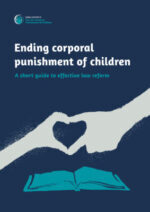Reforming national laws to prohibit corporal punishment
Drafting legislation which clearly prohibits all corporal punishment of children involves understanding current law, drafting new legislation which would prohibit, and then taking (or making) opportunities to introduce the relevant bill into parliament and to ensure its passage into law. National advocacy for prohibition should always involve the drafting of concrete proposals for new legislation.
The national Constitution and all other relevant laws and regulations should be reviewed in relation to:
- the home (parents and others with parental responsibility)
- alternative care settings (foster care, institutions, places of safety, emergency care, etc)
- day care, including early childhood care (nurseries, crèches, kindergartens, preschools, family centres, etc) and day care for older children (day centres, after-school childcare, childminding, etc)
- schools (state schools, religious schools, private schools, pre-school/primary/secondary education, full and part-time education)
- penal and other institutions (prisons, juvenile detention centres, approved schools, state or private health or mental health institutions etc)
- sentencing of children in conflict with the law (under state, customary and religious law)
It is important to identify whether domestic legislation contains a legal defence to the use of corporal punishment. All countries have laws making assault a criminal offence but in many states, the law also confirms that parents, and other people acting in the place of parents (in loco parentis), have a right to use “reasonable chastisement”, “lawful correction” or similar defences – assault disguised as discipline or control. In some states this is explicitly stated in legislation; in others, it is a rule established through case law.
The prohibition of corporal punishment must be enacted in law: prohibition by policy or regulations is not sufficient as it does not provide children with equal legal protection against assault and can often be undermined by legal defences for the use of corporal punishment. Achieving prohibition of all corporal punishment of children means ensuring that children are legally protected from assault just as adults are – even when the assault is inflicted in the guise of "discipline" or "correction" – in every setting of their lives, including the home.
As set out by the Committee on the Rights of the Child, prohibition is achieved when:
- all defences and authorisations of corporal punishment are repealed, and
- legislation explicitly prohibits all corporal punishment and other cruel and degrading punishment.
Simply repealing a defence or authorisation from legislation is a “silent” reform. It does not send a clear educational message to society that corporal punishment is no longer lawful. When the repeal of the defence is accompanied by the insertion of a statement which makes it clear that assault can no longer be justified as punishment or correction, explicit prohibition is achieved.
The key definition of corporal punishment is that provided in the Committee's General Comment:
The Committee defines 'corporal' or 'physical' punishment as any punishment in which physical force is used and intended to cause some degree of pain or discomfort, however light. Most involves hitting ('smacking', 'slapping', 'spanking') children, with the hand or with an implement - a whip, stick, belt, shoe, wooden spoon, etc. But it can also involve, for example, kicking, shaking or throwing children, scratching, pinching, biting, pulling hair or boxing ears, forcing children to stay in uncomfortable positions, burning, scalding or forced ingestion (for example, washing children’s mouths out with soap or forcing them to swallow hot spices). In the view of the Committee, corporal punishment is invariably degrading. In addition, there are other non-physical forms of punishment that are also cruel and degrading and thus incompatible with the Convention. These include, for example, punishment which belittles, humiliates, denigrates, scapegoats, threatens, scares or ridicules the child."
Whether or not it is felt necessary to include a definition of corporal punishment in law, it is crucial that prohibiting legislation sends a clear message that all forms of corporal punishment, without exception, are unlawful and that no loopholes are left for so-called "light" punishment.
The starting point for achieving prohibition is understanding the current law:
Read our detailed report of the law and corporal punishment in your country
Other key resources include:
- Committee on the Rights of the Child General Comment No. 8 (2006) on "The right of the child to protection from corporal punishment and other cruel or degrading forms of punishment (arts. 19; 28, para. 2; and 37, inter alia)"
- Ending corporal punishment of children: A short guide to effective law reform (2019) which includes guidance on reviewing current law and drafting prohibiting legislation
- List of states and territories which have legal defences derived from the English "reasonable chastisement" defence
- "Learning from states which have prohibited" (2014)
See also Technical publications on law reform.

